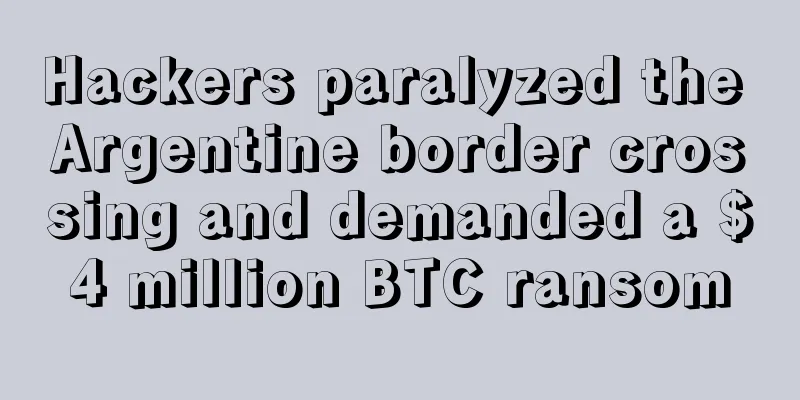Hackers paralyzed the Argentine border crossing and demanded a $4 million BTC ransom

|
On August 27, a hacker group forced Argentina to temporarily close all border crossings through a ransomware attack. The group also stole sensitive data from government agencies and eventually demanded a BTC ransom worth about $4 million in exchange for a decryption program, but Argentine government officials refused to negotiate with the group. According to Bleeping Computer on September 6, a group of hackers using the Netwalker ransomware virus invaded the Argentine Immigration Bureau (Direccion Nacional de Migraciones) on August 27 and initially demanded that the Argentine government pay $2 million to restore its servers. “Your files have been encrypted,” reads the ransom demand attached to a Tor payment page sent to the immigration agency. “The only way to decrypt your files is to purchase the decryption program.” The group released a selection of the agency’s sensitive data to identify the hackers who carried out the attack. A week later, the hackers raised the ransom demand to 355.8718 bitcoins — about $4 million at the time. Argentinian news outlet Infobae reported that the attack succeeded in paralyzing all border crossings in and out of Argentina for four hours. During the closure, authorities took offline all computer networks used by immigration officials in regional offices and checkpoints. Government officials reportedly said that "they will not negotiate with the hackers" and were not concerned about recovering the stolen data. While ransomware hackers are not restricted by national borders, the situation in Argentina is a rare example of a cyberattack affecting a national government agency. Brett Callow, a threat analyst and ransomware expert at Emsisoft Malware Lab, told the media that this attack not only has the potential to cause damage, but also involves leaking extremely sensitive data to the public. "This is particularly problematic in government situations, where extremely sensitive data may be involved, and in some cases even poses a risk to national security," Callow said. "With more than 1 in 10 ransomware attacks now involving data theft, and the list of hacker groups that regularly steal data growing, it's likely that incidents like this will become more frequent." |
Recommend
What does a woman with wide cheekbones mean?
Everyone looks different, so everyone's life ...
Very open-minded, living a carefree life every day
People who live a carefree life every day are gen...
How to calculate the thunder god's mouth? Is the thunder god's mouth a good face?
How to calculate the Thunder God's Mouth? Is ...
SSV founder was drafted into the army, SSV fell in response, let's take a look at what Israeli crypto projects are
SSV ssv.network (SSV) is a fully decentralized op...
What is the origin and theoretical basis of face-reading?
The so-called face fortune-telling refers to the ...
What is the fate of a woman with a widow's face?
In physiognomy, if a woman has a particularly bro...
Romanian University Plans to Accept Cryptocurrency as Payment for Admission Fees
A public university in the Romanian city of Sibiu...
Grin wallet configuration tutorial
Currently, the Grin mainnet has not yet been laun...
Palmistry to see whether you will have a successful career
All officials who pursue a career in politics hop...
How to read TCM disease and health palmistry
Our palm lines are not only related to our fortun...
People whose love line ends downward are easily hurt in relationships.
How to read the complete diagram of love line? Th...
How to read the face of the silkworm
In today's aesthetic, many people think that ...
What are the facial features of people with good temper and high self-cultivation?
In interpersonal communication, personality and t...
Caixin: Yao Qian and Di Gang appointed as director and deputy director of the Central Bank Digital Currency Research Institute
Reporter: Zhang Yuzhe Yao Qian, former deputy dir...
Is it good to have a birthmark on the foot? What does it mean?
Many people know about moles. Everyone has one on...









